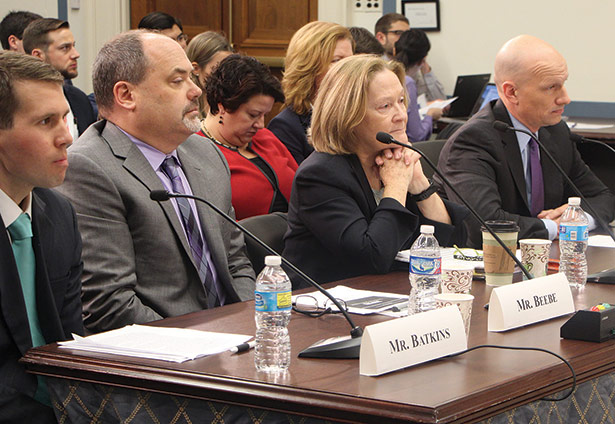Washington Update: The same old debate
Regulation versus the economy – it’s a debate that’s all too familiar on Capitol Hill. At a Dec. 9 hearing before the House Workforce Protections Subcommittee, the lines once again were drawn and the Obama administration’s regulatory policy was pitted against the need for economic growth.
“It should be clear to anyone who is listening that the current regulatory onslaught is making life harder for working families and small-business owners, not better,” subcommittee Chair Tim Walberg (R-MI) said in his opening statement.
Although he stressed that federal policies are important in ensuring safe and healthy workplaces, Walberg went on to say the current administration’s agenda “doubles-down on the same extreme regulatory approach” that hampers economic growth.
Three of the four hearing witnesses presented evidence against the current regulatory policy we’ve seen from OSHA and the Department of Labor during the past seven years.
“With this current pace of excessive regulation by the administration, more and more small businesses will either have to divert our monies to hiring compliance personnel as we did, or will simply decide that the burden is too great and get away from the over-regulation by dissolving the business,” said Ralph Beebe, a small-business owner who spoke on behalf of the National Federation of Independent Business.
Both Beebe and attorney Brad Hammock said government agencies – and specifically OSHA – need to take more steps to ensure any new rule being issued is necessary and accountable for adverse consequences.
 |
||
| Witnesses at a Dec. 9 hearing take questions from members of the House Workforce Protections Subcommittee. | ||
Hammock, who manages the Workplace Safety and Health Practice Group for law firm Jackson Lewis, listed three upcoming OSHA rules he claims could negatively affect business: silica, electronic reporting of injury records, and a recordkeeping clarification extending the statute of limitations.
“We are seeing OSHA now put forth several regulatory initiatives that have questionable benefits for employees or lack statutory authority altogether, and at the same time place significant burdens on businesses, both large and small,” Hammock said in his testimony.
Others at the hearing defended OSHA and its current regulatory agenda. Christine Owens, executive director of the National Employment Law Project, said workers are not adequately protected by current regulations, which are nearly half a century old and would take hundreds of years to update.
“Far from a ‘regulatory onslaught,’ the real crisis is a ‘regulatory drought’ when it comes to workplace safety and health,” Owens said.
In closing comments for the Democrats, Rep. Mark Pocan (D-WI) said pitting regulation against economic growth represents a false choice.
Pocan cited Bureau of Labor Statistics data that shows government regulations or interventions caused less than three-tenths of 1 percent of the job losses seen in mass layoffs during President Barack Obama’s first few years in office – a rate unchanged from the George W. Bush administration.
“There’s no doubt that ensuring worker safety, paying a living wage, strengthening the average American’s voice in the workplace and ensuring that the federal government contracts with responsible employers come at a cost,” said Pocan, a small-business owner. “Maintaining safe workplaces and protecting workers’ voices are worth that cost.”
Walberg took exception to Pocan’s comments, stating that the hearing was to benefit all stakeholders, and that no one wants to see employees get hurt. He reiterated claims that regulations can cost jobs, and said it’s important for needed rules to be done in a “realistic way, that promote opportunity, meet needs and make a better society.”
At the end of the hearing, the debate on regulation versus the economy remained unresolved. The next congressional hearing isn’t likely to provide any solutions, either.
And so, the debate continues.
The opinions expressed in “Washington Update” do not necessarily reflect those of the National Safety Council or affiliated local Chapters.

Post a comment to this article
Safety+Health welcomes comments that promote respectful dialogue. Please stay on topic. Comments that contain personal attacks, profanity or abusive language – or those aggressively promoting products or services – will be removed. We reserve the right to determine which comments violate our comment policy. (Anonymous comments are welcome; merely skip the “name” field in the comment box. An email address is required but will not be included with your comment.)

